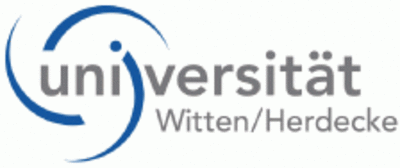
Witten/Herdecke University (UW/H)

Introduction
Witten/Herdecke University (UW/H) was founded and state recognized in 1983 and ever since has been a pioneer among Germany’s higher education institutions. Over a period of 30 years, we introduced significant innovations in research and teaching. As a model university, we stand for dynamic reforms of the traditional alma mater and the pursuit of a humanistic educational concept adapted to the challenges of our modern knowledge society. In adherence to Humboldt’s educational ideals, we perceive ourselves as an entrepreneurial university and strive to integrate research and student education, provision of scientific services, practical application and social responsibility. Theory-based and practice-oriented teaching at UW/H is always associated with the acquisition of subject-related, methodical, social and cultural competencies, value orientation and personal growth.
Witten researches.
Research at UW/H is interdisciplinary, highly diverse as to methodology, and focuses on well-defined areas. As a private university with a moderate percentage of state funding in our budget, we feel obliged to contribute something to society in return for the funds we receive. One way to do so is to generate innovative research results. Real-life problems call for transdisciplinary research. The social relevance of our chosen fields of research is as important in this respect as the transparent and generally understandable publication of research findings. Numerous UW/H projects are third-party financed. Over 40 applications for third-party funds were successful in 2010 alone. Our researchers cooperate with renowned national and international partners. All UW/H Faculties strive to address new and previously unexplored research areas and thereby to trigger significant developments.
Witten educates.
Education is much more than training for the job. In addition to subject-related expertise and skills, we also convey methods and strategies which enable our students for the rest of their lives to cope with complex and permanently changing demands of the modern knowledge society, either as generalists with specialization competencies or as specialists with a broad general basis of knowledge. In line with the Witten didactics, student education is problem-oriented, state-of-the-art and close to practice. Personal growth is another of our core objectives.
Interdisciplinary – undisciplined
Following Humboldt’s educational concepts, UW/H students study in small groups with an excellent student-teacher ratio and sufficient time and space to discover their talents and potentials and form their own opinions. Students are encouraged to think in wider contexts and assume social responsibility in and beyond a chosen discipline. The economic, ecological and social challenges of the future will certainly not respect the boundaries of academic disciplines.
Witten – fundamental.
Fundamental studies are a core element of the Witten/Herdecke identity. They foster out-of-the-box thinking. They embody the university’s guiding idea and facilitate learning processes beyond subject-related expertise. Here students tackle questions for which we have no ready answers, or for which there may be no answers at all. Education needs protracted reflection and a change of perspective needs alienation and distance from self and the world. Fundamental studies offer this opportunity to call a halt. They constitute an undisciplined and decelerated approach to a wealth of perspectives between reflection, communication, and art. Fundamental studies are the contemporary successor of ancient schools of the art of life and studia humanitatis. Among Germany’s universities the UW/H fundamental studies are the oldest and most sophisticated model that integrates academic issues and questions related to society, the arts, social justice, concern for one’s personal future, politics, psychology, philosophy and history, and assesses their relevance for an individual’s attitude, actions and conduct of life. In an increasingly complex, rapidly changing and insecure world, prospective physicians, entrepreneurs, managers, politicians or consultants need methodical, social, ethical and cultural competences as much as subject-related expertise.
Witten gets involved.
The role of higher education in society underwent radical changes in recent years. Research and teaching are still core activities at universities. But today we expect more. Civic engagement as the “third mission” in addition to research and student education has always been part of UW/H identity. At the founding ceremony of Witten/Herdecke University, Alfred Herrhausen spoke of “esprit engagé, a dedicated spirit to be developed and employed for the fostering of our society”. This spirit is an essential part of our philosophy and attaches equal importance to social responsibility, student education and generation of innovative research results. Right from the start, Witten/Herdecke University assumed social responsibility in many forms and on various levels. Witten/Herdecke University is in a continuous lively exchange with the community: with Witten’s citizens, the local and regional business world, social and cultural institutions, even international organizations, corporations, and foundations. In view of our tender age and a comparably small number of 1.300 enrolled students and 400 staff, we have produced an impressive number of social, cultural, commercial and non-profit initiatives.
Witten works.
Despite Bologna reforms, increasing economic constraints for universities and new degree programs for formerly non-academic professions, Witten/Herdecke University still offers the freedom of studies that are theory-based and close to practice, ethical and aesthetic, speedy or relaxed, dissident and unconditional, interdisciplinary and undisciplined. And if Harvard University President Drew G. Faust is right in her belief that university culture is essentially undisciplined and that this should be the starting point for future universities, then we seem well-positioned at UW/H. Accordingly, Witten/Herdecke University understands itself as an unconditionally undisciplined university in the sense proclaimed by Drew and Derrida, and as a place of critical thinking. Witten makes a difference, Witten works: in research, teaching and in society. In – and at the interfaces of – health, economics, and culture.
Detailed information
> Detailed information on Witten/Herdecke University and our international program.
Locations
- Witten
Witten Herdecke University, Alfred-Herrhausen-Straße 50, 58448 , Witten